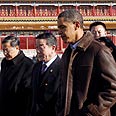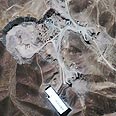
Obama during visit to China
Photo: Reuters

Qom enrichment plant
Photo: AP
WASHINGTON – An American warning that Israel
could bomb Iran
is what caused China to reconsider its stance
over the Iranian nuclear program and may have paved the way for new sanctions against the Islamic republic, the Washington Post reported Thursday.
The Chinese were told that Israel regards Iran's nuclear program as an "existential issue and that countries that have an existential issue don't listen to other countries." According to the Washington Post, the message was clear: Israel could bomb Iran, leading to a crisis in the Persian Gulf region and almost inevitably problems over the very oil China needs to fuel its economic juggernaut.
The Americans have been trying for some time to get China to join the camp of countries supporting tougher sanctions against Iran. According to the report, two weeks before US President Barack Obama visited China a week and a half ago, two senior White House officials - Dennis Ross and Jeffrey Bader – traveled to Beijing on a "special mission" to try to persuade China to pressure Iran to give up its alleged nuclear weapons program.
American Efforts
Yitzhak Benhorin
Ahead of Ahmadinejad's visit to Brazil, US president sends letter to his Brazilian counterpart, asking him to urge Iranian leader to hold dialogue with West and agree to send uranium abroad. President Lula expresses his support for Iran's right to develop nuclear energy for peaceful purposes
The Chinese response was given to the White House earlier this week. Beijing informed Washington that it would support a toughly worded, US-backed statement criticizing the Islamic republic for flouting UN resolutions by constructing a secret uranium-enrichment plant.
While largely symbolic, the Washington Post said, it is the first such declaration since 2006 to be backed by both China and Russia. And the statement marks a departure for China, which has long refrained from criticizing Iran's nuclear policies.
Obama presented the Iranian nuclear issue to the Chinese as extremely severe. The issue of how China will handle the Iranian nuclear issue has emerged as an early test of what Obama has described as a relationship that "will shape the 21st century."
Given its backing even from Iran's erstwhile allies, European diplomats on Wednesday predicted easy passage of the resolution, which calls Tehran's construction of an underground enrichment plant near Qom a "breach of its obligations" under UN and IAEA guidelines. If approved, the Washington Post said, the resolution will be referred to the UN Security Council, which could decide to enact harsher sanctions against the Islamic republic.
It is still unclear whether Russia or China would go further and agree to new sanctions against Iran. Russian President Dmitry Medvedev has already hinted that his country would agree to sanctions. American sources clarified several days ago that China would likely not veto a Security Council resolution against Iran.















